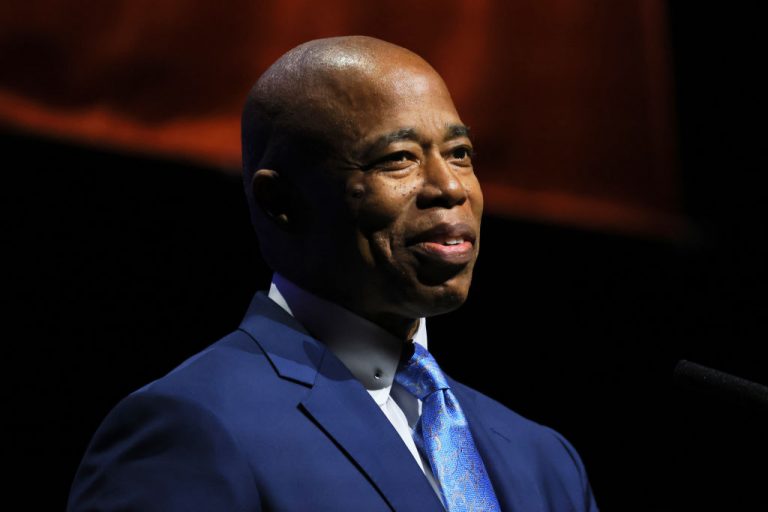New York City Mayor Eric Adams’ fiscal 2023 budget proposal, which was unveiled on April 26 at his first ever State of the City address, and was subsequently amended to include over $1 billion more in spending, is at risk of being upended by skyrocketing inflation.
In his budget, Adams has earmarked some $204 million for his 1,400-strong executive team, an increase from the $163 million de Blasio allotted to his office during his final year as mayor.
The $41-million boost is intended to be funneled to the Mayor’s Office of Contract Services (MOC), which reviews spending agreements and tracks vendor performance at a time when several city contracts with the majority of its unions are up for renegotiation.
The move increases the MOC’s budget by $32.5 million, which will allow the MOC to hire an additional 47 employees, increasing its headcount from 197 to 244.
Budget officials say the increase in funding and employee headcount are required in order to reform the city’s struggling contracting system, “which is plagued by delays that non-profit providers say make it significantly more difficult to provide social services,” the NY Post reported.
Success
You are now signed up for our newsletter
Success
Check your email to complete sign up
The increased spending appears to be in contrast to Adams’ public statements. He has repeatedly demanded that city agencies find ways to operate more efficiently and stretch their budgets.
“We’re going to continue to look for savings inside agencies, we’re going to continue to streamline what we’re doing,” Adams told reporters in April.
New York’s Department of Transportation is expected to see an increase to its budget by 13 percent, or $1.4 billion, making the department the second biggest winner in Adam’s budget.
On the losing end is the Small Business Services department that will have to manage a cut in funding of some 36 percent. The Department of Consumer Affairs and the Department of Design and Construction will have to manage significant cuts to their budgets as well with the Department of Consumer Affairs seeing its budget slashed by some 33 percent and the Department of Design and Construction will have to operate with 14 percent less funding next year.
Looming inflation threatens budget performance
Noticeably absent from the discussions surrounding the proposed budget is how skyrocketing inflation is factored in at a time when numerous union contracts are up for renegotiation.
On the national level, consumer prices have risen 8.5 percent over the 12 months ending in March, the highest annual rate of inflation since 1981. In New York however prices are increasing at a slower pace, with a 12-month jump of 6.1 percent.
While New York is weathering inflation somewhat better than the national experience, food costs are still up 7 percent over the past 12 months, recreation activities are up 8 percent and transportation is up 14 percent primarily driven by soaring fuel costs.
The mayor’s executive budget does set aside $1.7 billion to fund new contracts with the city’s municipal worker unions however this amount is less than half of what is needed should he agree to 3 percent increases, which fails to keep up with inflation. It’s expected that unions will bring higher asks to the table in the face of historic inflation.
“More than two-thirds of the city’s contracts with its unions have expired. All the biggest pacts expire by the end of the year, with the teachers’ deal ending in September and sanitation workers in December,” The City reported.
Typically, the city of New York negotiates a deal with one of its larger unions and uses the outcome of those negotiations as a template for discussions and deals with the city’s smaller unions.
Experts expect that union to be District Council 37, the city’s largest bargaining unit, which represents around 150,000 government workers.
Adams has set aside $1.7 billion to fund raises over the next three budgets. However, according to an analysis by the Citizens Budget Commission (CBC), a 3 percent annual raise will cost the city more than $4 billion by mid-2026, more than twice what is in the budget.
According to the CBC, each additional percentage point increase in salaries adds another $1.4 billion in costs over three years.
On Adam’s side is an expected increase in revenues due to inflation. Since New Yorker’s will be paying higher prices for goods and services, sales tax revenues will go up and city workers earning higher wages will result in pushing taxpayers into higher tax brackets which will assist in filling municipal coffers.
However these gains may be fleeting. The city’s cost for the goods it buys will inevitably increase due to inflation and expected hikes in interest rates by the Fed will make operating the city and funding debt more expensive.
Andrew Rein, president of the CBC recently said, “Inflationary pressures strongly reinforce the importance of the city and municipal unions working together to change work rules and other contractual constraints to improve productivity and offset costs of salary increases,” adding that, “Absent efficiency measures, higher raises may come at the expense of service cuts, workforce reductions or harmful tax increases — all bad choices.”
















